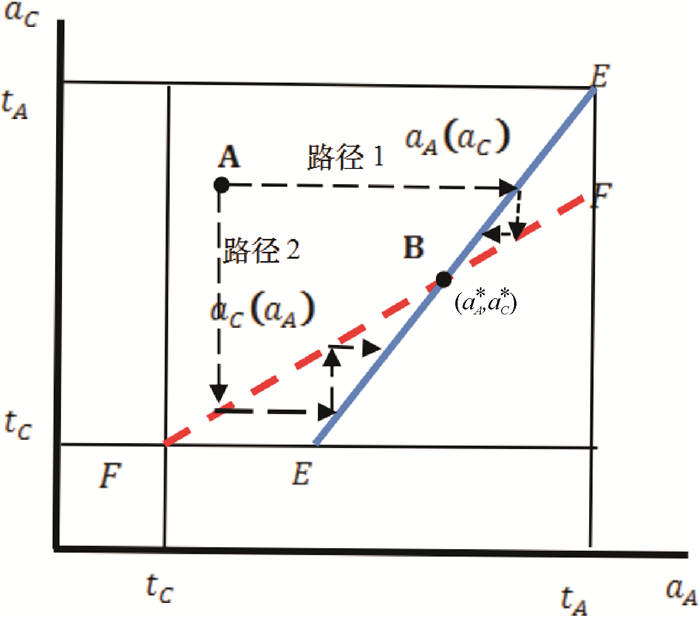Economic Analysis of National Standpoint, Public Preference and Diplomatic Discourse
-
摘要: 国家立场是固有的、理性的, 民众偏好则有理性和非理性之分, 外交话语阐述往往要在国家立场和民众偏好之间达到均衡。理性的经济分析能为国家外交政策、世界舆情等提供独特的解读视角。从政府效用函数最大化出发, 构建两国政策博弈模型并分析得出国家最优政策, 而外交话语便是对国家最优政策的表述。在此基础上建立两国外交话语博弈模型, 分析国家立场、民众偏好对外交话语阐述的影响。研究发现: (1)两国政策博弈会形成稳定的纳什均衡, 动态分析表明该均衡结果具有收敛性, 因而最优的外交政策取决于国家立场、两国立场差距以及国与国之间的合作偏好; (2)在既定的国家立场和最优政策前提下, 民众对于外交话语中“鹰派”或“鸽派”的表达偏好、双方对于合作的相对重视程度决定了外交话语阐述。Abstract: National standpoint is inherent and rational while public preference rational and irrational. The construction of diplomatic discourse requires the equilibrium between national standpoint and public preference. Rational analysis of diplomatic discourse offers a special perspective for the understanding of national diplomatic policies and world public opinion. Based on the maximization of government's utility function, this paper establishes a national policy game model and analyzes optimal national policy. Diplomatic discourse is the best expression of optimal national policy. Then, a diplomatic discourse game model is constructed to describe the impact of national standpoint and public reference on diplomatic discourse. The findings show that the national policy game leads to a stable Nash Equilibrium and it is convergent, and optimal national policy is determined by national standpoint, the gap between their own national standpoint and their preference for cooperation; suppose that the country's national standpoint and optimal policy are fixed, the construction of diplomatic discourse is determined by both the public preference for hawkish or dovish language style and government's willingness to cooperate.
-
[1] 金正昆. 现代外交学概论[M]. 北京: 中国人民大学出版社, 1999: 114. [2] 杨洁勉. 中国特色大国外交和话语权的使命与挑战[J]. 国际问题研究, 2016(5): 18-30, 137-138. https://www.cnki.com.cn/Article/CJFDTOTAL-GJWY201605004.htm [3] 胡开宝, 李婵. 国内外外交话语研究: 问题与展望[J]. 外语教学, 2018(6): 7-12. https://www.cnki.com.cn/Article/CJFDTOTAL-TEAC201806004.htm [4] 翁青青. 政治话语中的隐喻和身份构建: 以英国、加拿大、中国在德班气候大会上的发言为例[J]. 国际新闻界, 2013(8): 26-36. https://www.cnki.com.cn/Article/CJFDTOTAL-GJXW201308003.htm [5] 孙吉胜. 加强中国文化理念的国际传播——以"人类命运共同体"话语为例[J]. 对外传播, 2019(7): 4-6. https://www.cnki.com.cn/Article/CJFDTOTAL-DWDC201907002.htm [6] RUBINSTEINA. Economics and language[M]. Cambridge: Cambridge University Press, 2000. [7] PARIKHP. The use of language[M]. California: CSLI Publications, 2001. [8] SALLYD. Risky speech: behavioral game theory and pragmatics[J]. Journal of pragmatics, 2000, 35: 1223-1245. http://www.sciencedirect.com/science/article/pii/S0378216602001704 [9] PARIKHP. Pragmatics and games of partial information[C]//ABENZ, G JAGER, RVAN ROOIJ. Game theory and pragmatics. Basingstoke: Palgrave Macmillan, 2006. [10] 蒋勇. 曲言负极词语用得体性的博弈论分析[J]. 当代修辞学, 2019(4): 32-47. https://www.cnki.com.cn/Article/CJFDTOTAL-XCXX201904004.htm [11] 缪素琴, 祝尔悦. 互联网时代英语融入汉语的博弈语用学分析[J]. 外语研究, 2016(6): 39-43. https://www.cnki.com.cn/Article/CJFDTOTAL-NWYJ201606008.htm [12] SPENCEM. Job market signaling[J]. The quarterly journal of economics, 1973, 87(3): 355-374. http://qje.oxfordjournals.org/content/87/3/355.short [13] 王建龙. 把握社会舆情[J]. 瞭望新闻周刊, 2002(20): 1. https://www.cnki.com.cn/Article/CJFDTOTAL-LWZZ200220000.htm -





 下载:
下载:

